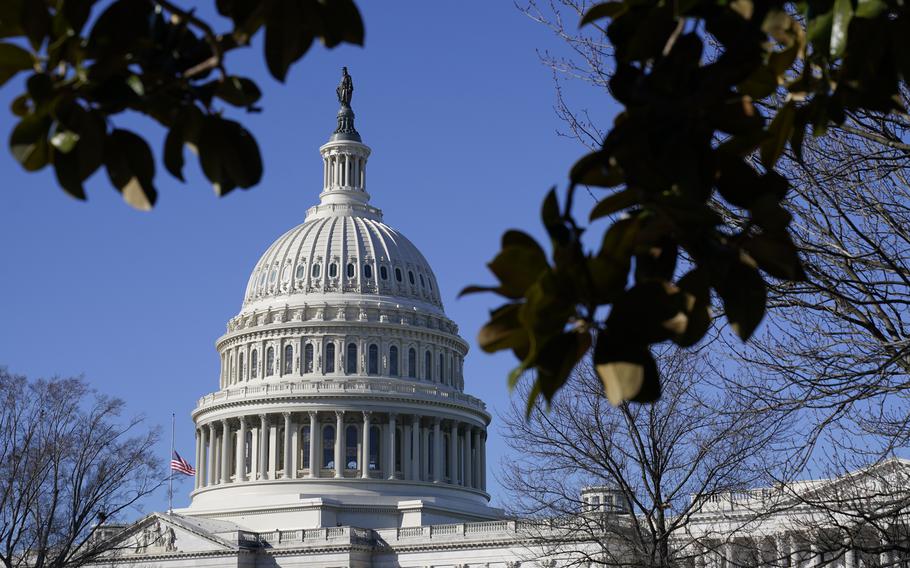
The U.S. Capitol dome on Capitol Hill in Washington, on Monday, Feb. 21, 2022. (Patrick Semansky/AP photo)
WASHINGTON — Congressional support for increasing the defense budget is gaining steam amid Russia’s invasion of Ukraine as Democrats and Republicans rally to meet Russian aggression with long-term military might.
The changing security landscape in Eastern Europe will “no doubt” increase next year’s defense budget, Rep. Adam Smith, D-Wash., chairman of the House Armed Services Committee, said at an event last week. Other Capitol Hill lawmakers say they are also prepared to funnel more money to the Pentagon as the U.S. rethinks its national security and defense posture.
“President [Joe] Biden needs to put a serious budget proposal forward to confront the real threats we face,” Sen. Kevin Cramer, R-N.D., said in a statement. “Russia is just one reason why defense spending needs to be higher. China and other nations are watching the seriousness and resolve of freedom-loving nations.”
Russia’s unprovoked attack on Ukraine has prompted other NATO countries to pledge additional funding for their armed services.
In a reversal of decades of post-Cold War policy, Germany’s Chancellor Olaf Scholz said last month that his country would embark on a $110 billion rearming program. Poland announced last week that it will raise its spending on defense from 2% to 3% of the country’s gross domestic product. Leaders of France, Italy, Latvia and Romania have all vowed in recent days to boost their commitment to defense.
U.S. lawmakers authorized nearly $778 billion for defense spending for the 2022 fiscal year — $25 billion more than requested by the White House. The Biden administration has yet to submit its budget request for fiscal year 2023, which starts Oct. 1, but Smith said last week that the eventual spending plan will be “the most impactful and important budget that we’ve seen in the 25 years I’ve been in Congress.”
Sen. Jim Inhofe of Oklahoma, the top Republican on the Senate Armed Services Committee, said he wants to see defense expenditures grow by at least 3% to 5%, adjusted for inflation. A longtime proponent of a muscular U.S. presence abroad, Inhofe, who is retiring from the Senate on Jan. 3, said the 2018 National Defense Strategy made clear that the U.S. needs to be prepared for a serious military competition with Russia.
“I’ve always said that the best way to deter our adversaries is with a strong U.S. military and that requires us to step up investment in our armed forces,” Inhofe said in a statement.
Sen. Deb Fischer, R-Neb., will also support a bigger defense budget because “the world has become more dangerous” under Russia’s onslaught, her spokesperson said. An aide for Sen. Tim Kaine, D-Va., said he is open to an increase in Pentagon funding, if necessary.
Democrats have traditionally balked at rising defense costs. A year ago, 50 House Democrats urged Biden to significantly slash the Pentagon’s “already inflated” budget and redirect military spending to diplomacy, humanitarian aid and other initiatives, according to a letter that they sent to the White House.
But now there is a unique moment of bipartisanship that will allow the Pentagon to request and receive just about anything it wants, Rep. Elissa Slotkin, D-Mich., said last week during a House Armed Services Committee hearing. Congress is poised to approve $14 billion for Ukraine aid this week, including nearly $5 billion for additional troops in Europe and replenishing U.S. weapons already sent to Ukraine. The House passed the package Wednesday and the Senate is expected to vote on the bill by Friday.
“Over multiple administrations, Democrat and Republican, we have tried to minimize friction with Putin and with Russia, in the hopes that it wouldn't exacerbate a problem… And I feel like that era is over,” said Slotkin, a former Pentagon official. “I think it's a sea change for how both the Defense Department and the State Department should think about our presence in Europe.”
Rep. Anthony Brown, D-Md., an Army veteran who sits on the House Armed Services Committee, said a robust defense budget is just as essential as funding domestic programs, particularly at this precarious time.
“Right now the world’s resolve is being tested by Russia’s invasion of Ukraine and upending of international law,” Brown said in a statement. “As we work to counter Russia’s actions, I look forward to closely working with our military leaders and colleagues in Congress to ensure our country has the resources it needs.”